Medical terminology, the language of healthcare, empowers professionals to communicate effectively and accurately about complex medical concepts. From anatomical structures to physiological processes, understanding medical terminology is crucial for providing optimal patient care.
This comprehensive guide explores the different types of medical terminology, their usage, and the importance of accurate communication in healthcare. We’ll also delve into the challenges of translating medical terminology across languages and explore the future advancements shaping this essential aspect of healthcare.
Definition of Medical Terminology
Medical terminology is a specialized language used by healthcare professionals to communicate about medical conditions, treatments, and procedures. It is a complex and ever-evolving field, with new terms being added all the time. However, understanding medical terminology is essential for anyone who wants to work in the healthcare field, or for patients who want to be able to understand their own medical records.
Common Medical Terms
Some common medical terms include:
- Anatomy: The study of the structure of the body.
- Physiology: The study of how the body functions.
- Pathology: The study of disease.
- Pharmacology: The study of drugs.
- Surgery: The treatment of disease by surgical means.
Importance of Understanding Medical Terminology
Understanding medical terminology is important for several reasons. First, it allows healthcare professionals to communicate with each other clearly and concisely. Second, it allows patients to understand their own medical records and make informed decisions about their care. Third, it can help people to understand health-related information in the media and on the internet.
Types of Medical Terminology
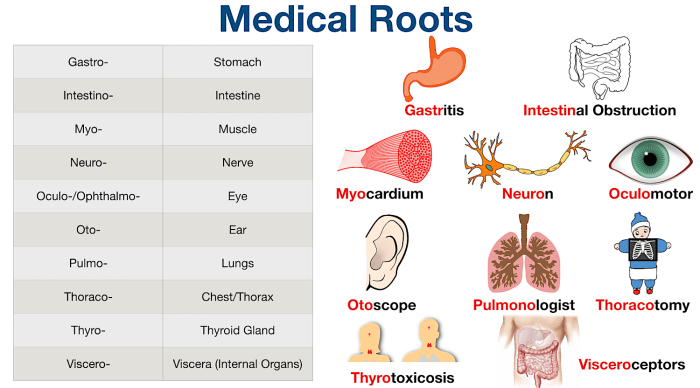
Medical terminology is a specialized language used by healthcare professionals to communicate about medical conditions, treatments, and procedures. There are different types of medical terminology, each with its own purpose and usage.
Anatomical Terminology
Anatomical terminology describes the structure and location of body parts. It uses terms that are based on the Latin or Greek names of the body parts. For example, the term “cranium” refers to the skull, and the term “femur” refers to the thigh bone.
Physiological Terminology
Physiological terminology describes the functions of the body and its organs. It uses terms that describe how the body works, such as “respiration” for breathing and “digestion” for the process of breaking down food.
Pathological Terminology
Pathological terminology describes diseases and other medical conditions. It uses terms that describe the symptoms, causes, and treatment of diseases. For example, the term “pneumonia” refers to an infection of the lungs, and the term “cancer” refers to a group of diseases that involve the uncontrolled growth of cells.
Pharmacological Terminology
Pharmacological terminology describes drugs and other medications. It uses terms that describe the names, dosages, and side effects of drugs. For example, the term “acetaminophen” refers to a pain reliever, and the term “insulin” refers to a hormone that is used to treat diabetes.
Medical Terminology Resources
To enhance your understanding of medical terminology, there are various credible resources available. These resources provide comprehensive information and guidance, helping you master the language of healthcare professionals.
Dictionaries and Glossaries
Dictionaries and glossaries are essential tools for defining and clarifying medical terms. They provide concise explanations, pronunciation guides, and often include illustrations or examples for better comprehension.
- Dorland’s Illustrated Medical Dictionary:A comprehensive and authoritative dictionary with over 120,000 entries.
- Stedman’s Medical Dictionary:Another highly regarded dictionary known for its extensive coverage and detailed definitions.
- Mosby’s Medical Dictionary:A user-friendly dictionary with clear and concise definitions.
Textbooks
Textbooks offer a structured approach to learning medical terminology. They provide in-depth explanations, exercises, and case studies to reinforce your understanding.
- Medical Terminology for Health Professions:A comprehensive textbook covering the basics of medical terminology, anatomy, and physiology.
- Medical Terminology: A Programmed Approach:A self-paced textbook with interactive exercises and quizzes.
- Exploring Medical Language: A Student-Directed Approach:A user-friendly textbook with engaging activities and exercises.
Online Resources
Online resources provide convenient and accessible options for learning medical terminology. They offer interactive exercises, quizzes, and forums to enhance your learning experience.
- Medical Terminology Online:A website with a wide range of resources, including a dictionary, flashcards, and quizzes.
- e-Anatomy:An online platform offering 3D anatomical models and medical terminology definitions.
- MedTerms:A comprehensive medical dictionary and resource website.
Tips for Effectively Using Medical Terminology Resources
To maximize your learning from medical terminology resources, consider the following tips:
- Use multiple resources:Combining different resources can provide a more comprehensive understanding.
- Practice regularly:Regular exposure to medical terms is crucial for retention.
- Break down terms:Divide complex terms into smaller components to understand their meaning.
- Use context:Try to understand terms within the context of medical scenarios.
- Seek help when needed:Don’t hesitate to ask for assistance from instructors or medical professionals if you encounter difficulties.
Using Medical Terminology in Healthcare
Medical terminology is a specialized language used by healthcare professionals to communicate about patients’ health and medical conditions. It is essential for accurate and consistent communication among healthcare providers, ensuring that everyone involved in a patient’s care has a clear understanding of the patient’s medical history, diagnosis, and treatment plan.
Importance of Accurate and Consistent Use of Medical Terminology
Accurate and consistent use of medical terminology is crucial for several reasons. First, it helps to avoid misunderstandings and errors in communication. When healthcare professionals use the same terms to describe medical conditions and treatments, they can be confident that they are on the same page and that there is no room for misinterpretation.
Second, accurate medical terminology ensures that patients receive the correct care. When healthcare providers use precise and unambiguous terms, they can accurately document a patient’s medical history and communicate with other healthcare professionals involved in the patient’s care. This helps to ensure that patients receive the appropriate treatment and that their medical records are accurate and complete.
Examples of Medical Terminology Use in Different Healthcare Settings
Medical terminology is used in a variety of healthcare settings, including hospitals, clinics, and doctor’s offices. In hospitals, medical terminology is used to document patients’ medical histories, physical exams, and treatment plans. In clinics, medical terminology is used to record patient encounters, prescribe medications, and order tests.
In doctor’s offices, medical terminology is used to take patient histories, perform physical exams, and provide treatment recommendations.
Future of Medical Terminology
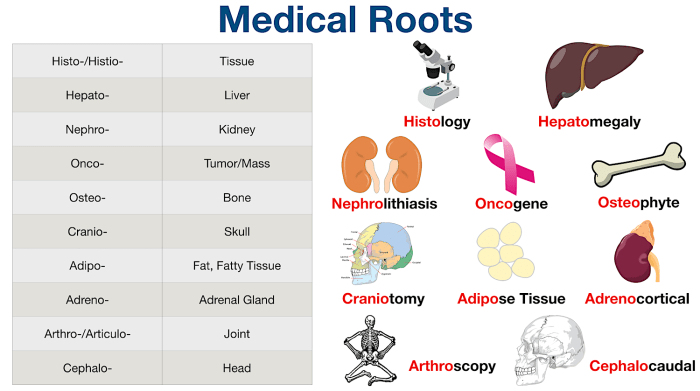
The future of medical terminology holds exciting advancements that will revolutionize healthcare communication. Emerging trends and technological innovations are shaping the evolution of medical terms, enhancing accuracy, efficiency, and accessibility.
One significant trend is the adoption of standardized terminologies. Initiatives like SNOMED CT and LOINC are gaining widespread acceptance, ensuring consistency and interoperability across healthcare systems. This standardization streamlines communication, reduces errors, and facilitates data sharing.
Impact of Technology
Technology is playing a pivotal role in the evolution of medical terminology. Natural language processing (NLP) and artificial intelligence (AI) are enabling machines to understand and interpret medical language, automating tasks and improving communication efficiency.
- NLP can analyze electronic health records (EHRs) and extract relevant information, such as diagnoses and medications, reducing the burden on healthcare professionals.
- AI can assist in the development of new medical terms and concepts, ensuring they are aligned with current medical knowledge and practices.
Prediction of the Future
The future of medical terminology lies in its continued evolution towards greater precision, accessibility, and interoperability. As technology advances, we can expect:
- Universal Adoption of Standardized Terminologies:SNOMED CT and other standards will become ubiquitous, creating a common language for healthcare professionals worldwide.
- Integration with AI and Machine Learning:AI will enhance the accuracy and efficiency of medical terminology, automating tasks and providing real-time support to healthcare professionals.
- Patient-Centric Terminology:Medical terminology will become more accessible to patients, empowering them to actively participate in their healthcare decisions.
Closing Summary
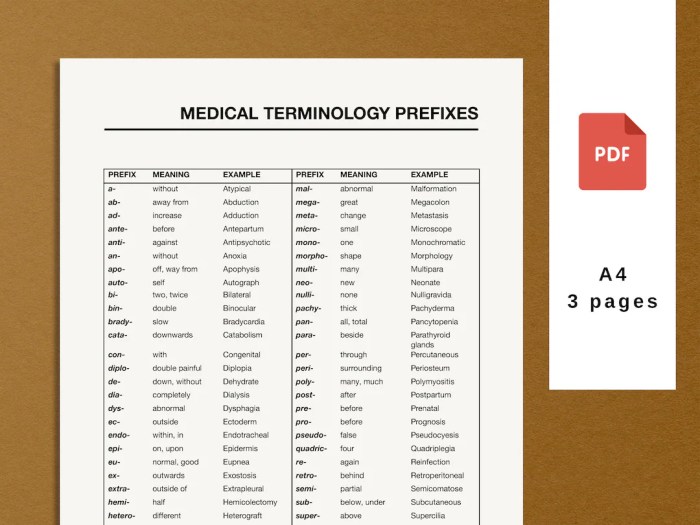
Medical terminology is a dynamic and ever-evolving field, reflecting the advancements in healthcare and the need for precise communication. As technology continues to play a significant role, we can expect further innovations that will enhance the accessibility and accuracy of medical terminology, ultimately benefiting patient care and improving healthcare outcomes.
FAQ Guide
What is the purpose of medical terminology?
Medical terminology provides a standardized language for healthcare professionals to communicate accurately and consistently about medical concepts, ensuring clarity and reducing errors in patient care.
How can I learn medical terminology?
There are various resources available to learn medical terminology, including dictionaries, glossaries, textbooks, and online courses. Additionally, healthcare institutions often offer training programs for their staff.
Why is it important to use medical terminology correctly?
Accurate use of medical terminology is essential for clear communication among healthcare professionals, reducing the risk of misinterpretation and ensuring patient safety.
How does medical terminology vary across different languages?
Medical terminology can vary across languages due to cultural and linguistic differences. Translating medical terminology requires expertise to ensure accuracy and maintain the intended meaning.
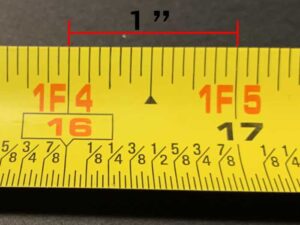

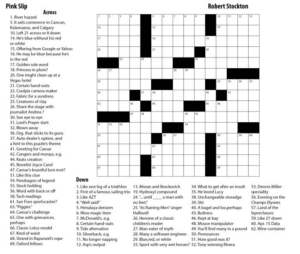


Leave a Comment